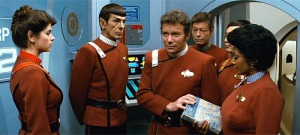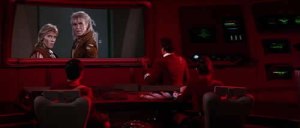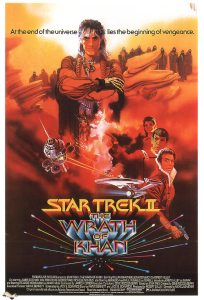Everyone has that one movie they watched more than any other when they were a kid. That film that kids never got tired of, and could watch on repeat with the biggest smiles on their faces. The movie that fills them with endless joy, bringing them back to some their happiest moments of childhood.
My best friend admits that film for him is Jean-Claude Van Damme's "Bloodsport," while my sisters will happily say Disney's "The Fox And The Hound," which we never owned a physical copy of and just choose to keep renting from Blockbuster, even though buying it probably would have saved us some money.
For me, I can honestly say that the film I watched the most as a child was Nicholas Meyer's "Star Trek II: The Wrath Of Khan." I watched this classic science fiction tale of the Star Trek crew more than any single Godzilla film, Disney animated picture or television shows on Nickelodeon. At a young age, I was entranced by the space battles that felt like two titans dueling it out, while ending in a struggle to out run a bomb that threatened to kill every one of these beloved characters, giving us one of the saddest moments for any child to watch.
But as I've grown older, I've revisited this film while attempting to remove the nostalgia goggles and see if it holds up. Each time I watch "Star Trek II: The Wrath Of Khan" now, I have grown to love it even more as it tells a literary-worthy tale of aging, revenge, loss, acceptance and mortality without ever trying too hard.

Set a few years after the events of "Star Trek: The Motion Picture," James T. Kirk (William Shatner) has been promoted from Captain to Admiral and now sits behind a desk, while he watches young cadets who "don't know how to steer (the spaceship)" hop around the galaxy. Meanwhile, the crew of the USS Reliant searches for a barren planet to test a controversial device on and accidentally discovers Khan (Ricardo Montalban), who was stranded on this rock in space by James Kirk fifteen years ago and never bothered to check up on him. Khan, a genetically engineered super solider, uses his intellect to take command of the Reliant and begins his plan for revenge against Kirk.
Harve Bennett, the producer and story writer for "Star Trek II: The Wrath Of Khan," had never watched a single episode of "Star Trek" before making this film. So, unlike J.J. Abrams, Bennett decided to watch every episode of the original series to understand what would make a good "Star Trek" movie. He ultimately decided to tell a Shakespearian space opera that would begin with a simple image - An aging Kirk, on his birthday, surrounded by cadets just coming out of training.
Kirk admits early in the film that gallivanting around the universe was a job for the young. That he no longer fits that mold and he should try to find a new place for himself in the universe, much to the dismay of his friends, Dr. McCoy (DeForrest Kelley) and Spock (Leonard Nimoy). He is reminded that commanding the Enterprise was what he was good at and he loved more than anything else. But he knows that, in his old age, he is more likely to make mistakes and endanger his crew.
What Kirk didn't count on was that the mistakes he made in his youth would come back to bite him, especially Khan.
Khan is the best singular villain in the Star Trek universe, because he is the antithesis of Kirk. Where Kirk is brash, innovative and charismatic, Khan is cold, calculating and would not hesitate to snap your neck. This is amplified when you realize just how much Khan despises Kirk, the man who left him and his entire crew to die on a lifeless planet.

One of the most important shots in the film is a glimpse of Khan's bookshelf, where we see books such as "King Lear," "Paradise Lost," "Dante's Inferno" and "Moby Dick." With how much time Khan had on his hands, there's no doubt he read those novels endlessly while he watched his crew slowly fade away and used those as the inspiration to mount his revenge on Kirk. Afterall, he was prince on Earth at one point, much like Satan was in "Paradise Lost," who had fallen to the lowest depths, shunned from the rest of the world.
Now that Khan has a ship and the means to mercilessly pursue Admiral Kirk, he has become Captain Ahab. And he must obsessively hunt down the white whale that wronged him. No matter the cost, no matter what gets in his way, Khan will stop at nothing to see Kirk burn.
"I've done far worse than kill you," says Khan to Kirk. "I've hurt you. And I wish to go on hurting you."

Another point that Harve Bennett realized about the original series of "Star Trek" was how Kirk always cheated death, or escaped death by the skin of his teeth "and patted himself on the back for his ingenuity" but had never faced death before. This is shown in the Kobiyashi Maru test that all Starfleet trainees must take, which is a no-win scenario that is more of a test of character to see how everyone reacts to an impossible situation, where death is inevitable.
Because how we deal with death is just as important as how we deal with life.
But we learn that Kirk took the Kobiyashi Maru test three times, and beat the simulation by reprogramming it. In other words, he cheated. Because Kirk doesn't like to lose.
Yet, when Khan arrives, Kirk must lose. He must finally face death and the vengeance of the man that he wronged. The mortality that he has so carelessly tossed around is now facing him with a weapon that could destroy an entire planet.

All of this reaches its boiling point in the scene that is now famously parodied, due to Shatner's delivery of his frustration with Khan, as he screams at the top of his lungs with his eyes nearly popping out of his skull. But in the sequence that follows, Kirk reflects on the life that he could have had if he settled down with Carol Marcus and their son David, instead of one with Khan hunting him down and a young crew that is dying thanks to him. Shatner speaks barely above a whisper, and is able to speak louder than his screams as he realizes that he is old and worn-out.
I bring all of this up to show that, even without the action sequences that I loved as kid, "Star Trek II: The Wrath Of Khan" is able to tell an elaborate and well-thoughtout story that reflects the characters from the television show, while also making them more human in the process. People often remember this film for the submarine-like duel climax in the nebula and the heart-breaking ending, but now I find myself being enthralled in the conversations between Kirk and Saavik (Kirstie Alley) as much as the space battles that flow organically from the plot.
Overall, "Star Trek II: The Wrath Of Khan" is one of the glowing examples of my evolution through cinema. As a kid, I loved this film for its action, effects and suspense. But, as I grew up, I began to see there was so much more that it had to offer. From the Shakespeare-like story, to the catchy score by James Horner. This shows that some films get better with age, while others get better while you age.


1 comment:
KHAN!!!!!!!!!!
Post a Comment